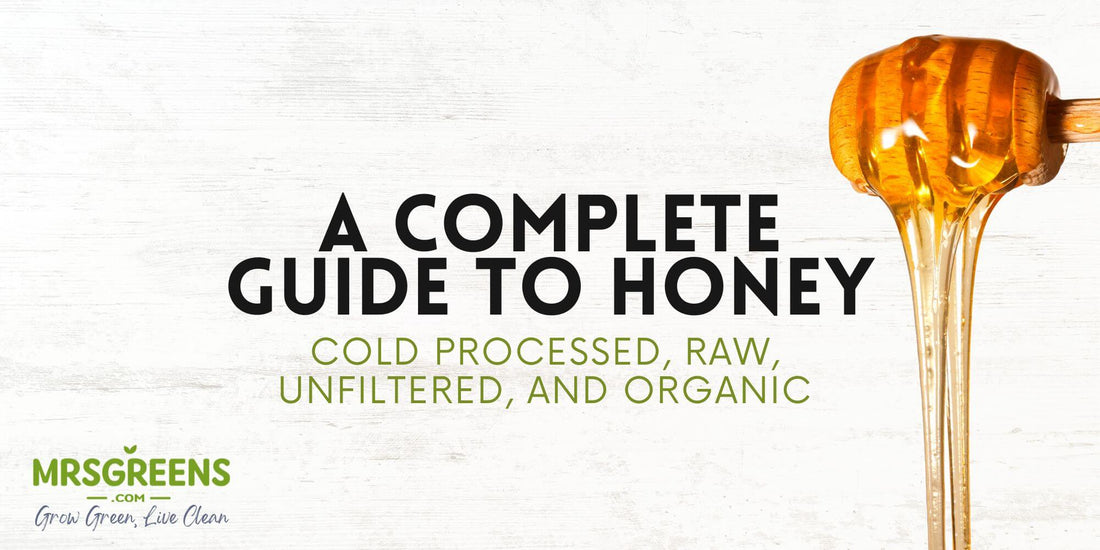Welcome to the sweet world of honey – a natural wonder that has graced our tables for centuries. At Mrs. Greens, we're passionate about not just enjoying this golden delight but understanding it too. So, let's dive into the sticky details of raw unfiltered honey, raw honey, unfiltered honey, and organic honey, and discover which type resonates with your eco-friendly lifestyle.
What is Honey?
Honey, made by industrious bees, is more than just a sweetener. It's a symbol of nature's interconnectivity and our responsibility towards sustainable living. Each jar of honey holds a story of the environment, beekeeping practices, and ethical choices.
Different Types of Honey
Raw Unfiltered Honey
- Description: Raw unfiltered honey is extracted directly from the honeycombs and is not heated or significantly processed. It often contains bits of wax, pollen, and propolis.
- Benefits: Known for its natural enzymes, antioxidants, and potential antibacterial properties. It's often used in natural remedies and is believed to help with allergies due to its pollen content.
- Considerations: Its raw state might not be suitable for everyone, especially infants or those with compromised immune systems.
Raw Honey
- Description: Raw honey undergoes minimal processing, typically just enough to remove visible impurities. It is not pasteurized but may be gently strained.
- Benefits: Retains most of its natural nutrients, vitamins, and enzymes. It's a healthier alternative to refined sugars and syrups in recipes and beverages.
- Considerations: The flavor and texture can vary greatly depending on the floral source, and it tends to crystallize over time, which is a natural process.
Unfiltered Honey
- Description: Unfiltered honey is slightly processed to remove larger impurities but still contains fine particles and pollen. It is often slightly heated to facilitate packaging but not enough to destroy its nutrients.
- Benefits: Offers a richer flavor and contains more pollen compared to fully processed honey. It's often preferred for its more robust taste and nutritional profile.
- Considerations: May not be as clear as filtered honey and can crystallize quicker.
Organic Honey
- Description: Organic honey adheres to organic regulations in beekeeping, including the avoidance of pesticides and antibiotics in bee colonies. The bees' foraging areas must also be free from chemical contamination.
- Benefits: Free from environmental toxins it's ideal for those committed to organic and chemical free lifestyle. However Organic Honey comes at an ecological cost, its carbon footprint.
- Considerations: It tends to be more expensive due to the stringent production standards and certifications required.
Cold Processed Honey
- Description: This honey is extracted and bottled without the use of heat, preserving its natural enzymes, vitamins, and nutrients that can be damaged by high temperatures. Also known as cold pressed honey, or cold extracted honey.
- Benefits: Considered one of the purest forms of honey, cold processed honey maintains its natural health properties and is rich in flavor. It is often sought after for its potential health benefits, including improved digestion and immune support.
- Considerations: Like raw honey, it can crystallize over time and may have variations in flavor and texture based on the floral source.
Nutritional and Health Benefits
Each type of honey has its unique health benefits. Raw and unfiltered honeys are celebrated for their antibacterial properties and antioxidants, while organic honey ensures you're consuming a product free from environmental toxins. Remember, moderation is key, as honey is still a sugar source.
Sustainable Beekeeping and Environmental Impact
Choosing your honey type also means considering its environmental impact. Sustainable beekeeping practices are crucial for the health of our ecosystems. By selecting organic and raw honeys, you're supporting beekeepers who prioritize bee welfare and environmental health.
How to Choose the Right Honey
When shopping for honey, look for credible certifications, understand the labeling, and consider the source. At Mrs. Greens, we've curated a selection of high-quality organic and eco-friendly honey to align with your sustainable choices.
Conclusion
Understanding the nuances between different types of honey can enhance your culinary experience and contribute positively to the environment. Whether you're a raw honey enthusiast or an organic honey devotee, each choice matters in our collective journey towards a greener planet. Join us at Mrs. Greens as we explore more ways to live sustainably and delight in nature's bounty.
Embracing the Sweet Side of Sustainable Living
We hope this guide has illuminated the fascinating world of honey. For more insights into eco-friendly practices and to explore our range of healthy and ecofriendly products, visit us at Mrs. Greens.

